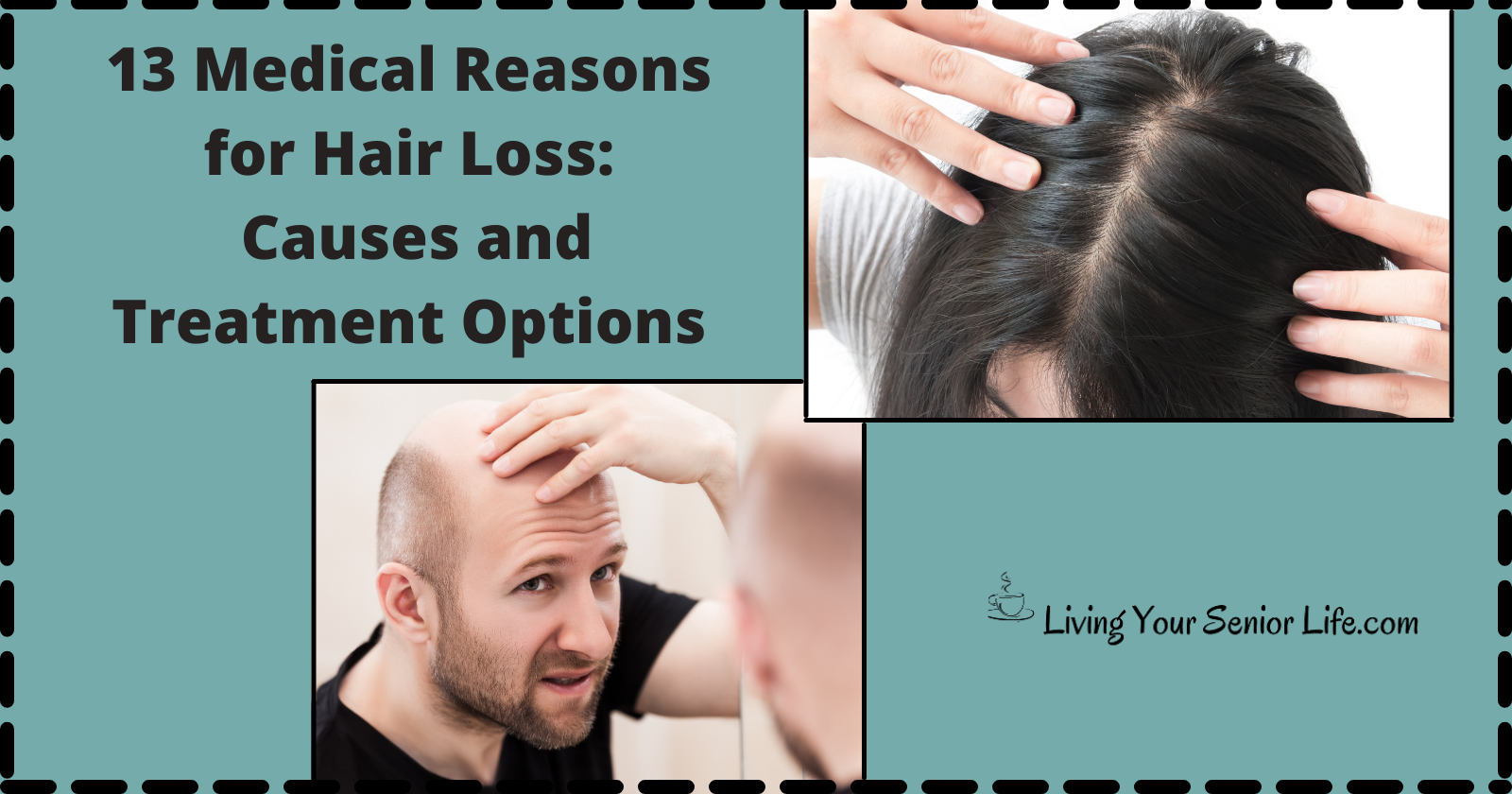Hair loss can be a distressing experience for both men and women. While genetics is often the main culprit behind hair loss, there are various medical conditions that can also contribute to it. It’s crucial to consult with a doctor to identify the underlying cause of hair loss, as many medical issues can be resolved, and hair growth can resume.
In this article, we will discuss 13 medical conditions that can lead to hair loss. We will also explore the hair growth cycle, types of hair loss, and common causes of hair loss such as aging, hormonal imbalance, and medication. By understanding the medical reasons for hair loss, you can take the necessary steps to address the issue and potentially regain your hair.
This post is for informational purposes only and should not be used in place of the advice of a medical professional.
Key Takeaways:
- Hair loss can be caused by various medical conditions, in addition to genetics.
- It’s important to consult with a doctor to identify the underlying cause of hair loss.
- Understanding the medical reasons for hair loss can help you take the necessary steps to address the issue and potentially regain your hair.
Hair Growth Cycle
To understand how certain health conditions can result in hair loss, it can be helpful to understand hair growth and its cycle. Your hair growth cycle is made up of four stages: anagen, catagen, telogen, and exogen. Any disruption along the growth cycle can cause hair loss.
- Anagen Phase
- Your hair actively grows from the root of a hair follicle. Blood vessels feed the root and make the hair grow.
- Catagen Phase
- A transitional stage where hair growth slows down.
- Telogen Phase
- Your hair is a rest and shedding may occur.
- Exogen Phase
- New hair growth pushes out the old hair, and the cycle starts anew.
Video: 13 Medical Reasons for Hair Loss
13 Reasons for Hair Loss: Let’s Take A Look
Alopecia Areata
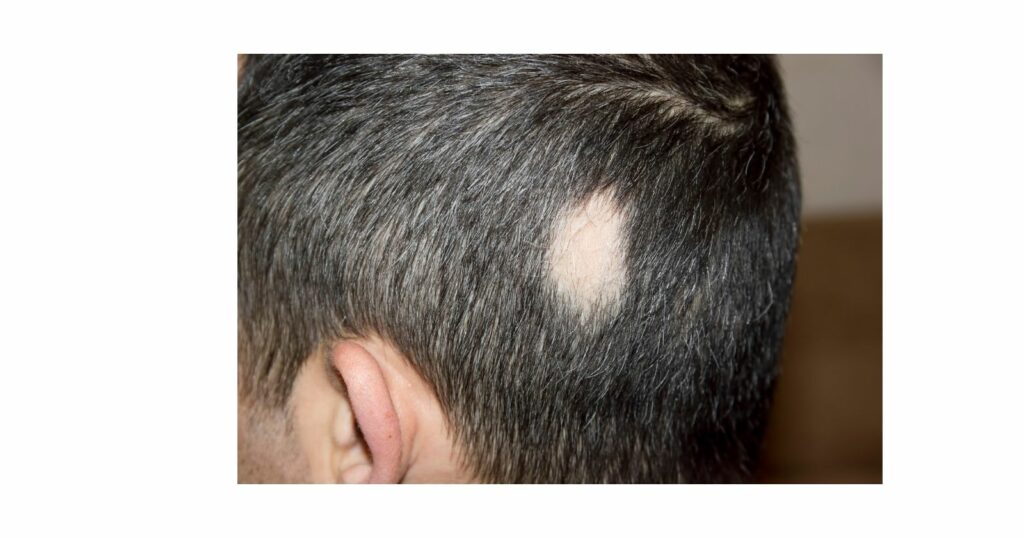
Alopecia Areata is a type of autoimmune disease where the immune system mistakenly attacks hair follicles, leading to hair loss in patches. The exact cause of alopecia areata is unknown, but genetics may play a role. People with asthma, Down Syndrome, pernicious anemia, seasonal allergies, thyroid disease, and vitiligo may be more susceptible to developing alopecia areata.
Alopecia areata can affect both males and females and is most commonly seen in individuals between the ages of 30 and 60. It is rare for children under the age of three to develop alopecia areata.
Although there is no cure for alopecia areata, there are various treatments available to manage the symptoms. Anti-inflammatory drugs, topical immunotherapy, and Minoxidil (Rogaine) have shown to be effective in some cases.
Alopecia Areata Synopsis:
- An Autoimmune Disorder
- Seen in Both Males and Females
- Hair Falls Out in Patches
- Possible Genetic and Other Predispositions
- Most Often Seen in Ages 30 – 60
- Rare Before Age Three
- Not Curable but Treatable
- Hair Loss Permanent
- Early Adult Onset
- Adolescent and Childhood Onset is Rare
Scarring Alopecia
If you are experiencing hair loss due to scarring alopecia, it means that your hair follicles are being destroyed, which is replaced by fibrous or scar tissue. Unfortunately, the hair loss caused by scarring alopecia is permanent, and there is no known cure at this time. The goal of treatment is to prevent further hair loss. Scarring alopecia usually occurs in early adulthood, and it is rare in adolescents and children. Approximately 7% of patients seen at hair loss clinics experience scarring alopecia.
Scarring Alopecia Synopsis:
- Destroys the Hair Follicles and Replaces Them with Scar Tissue
- Hair Loss Permanent
- Early Adult Onset
- Adolescent and Childhood Onset is Rare
Anagen Effluvium
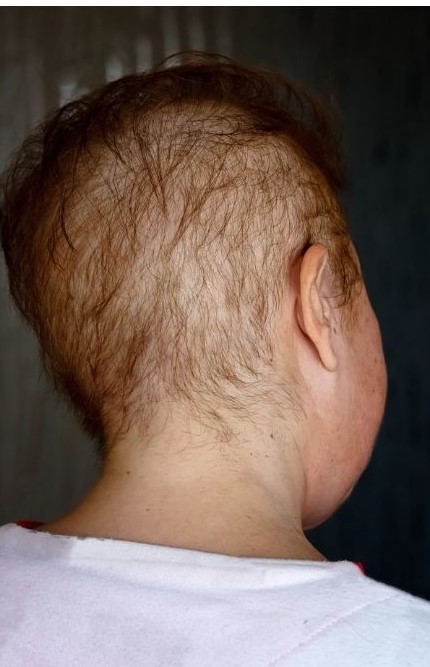
Anagen Effluvium is a type of hair loss that occurs during the hair growth stage of the hair cycle. It is usually caused by exposure to toxins such as chemotherapy drugs, radiation, chemicals, and poisons like Thallium, Boron, and Arsenic. In some cases, autoimmune diseases and infections can also cause Anagen Effluvium. Once the exposure to the cause is stopped, hair growth usually resumes.
Common treatments to help in the regrowth of hair include a topical minoxidil solution and scalp cooling during chemotherapy. It is important to note that hair shedding stops 3-6 months after chemotherapy has stopped. A change in the color and texture of new hair may occur.
Anagen Effluvium Synopsis:
- Hair Shedding During Hair Growth Stage
- Common Causes:
- Autoimmune Disease
- Chemotherapy
- Stops 3 – 6 Months After Chemotherapy Has Stopped
- Radiation
- Exposure to Chemicals/Poisons – Such as Thallium, Boron, and Arsenic
- Infection
- Once Exposure to Cause is Stopped, Hair Growth Usually Begins
- Change of the Color and Texture of New Hair Growth May Occur
Child Birth

If you’re a new mom, you may experience excessive hair shedding postpartum. This is a common occurrence caused by hormonal changes during pregnancy and childbirth. The body has higher levels of progesterone and estrogen during pregnancy, which causes hair to stay in the growth period of the hair growth cycle. Once birth occurs, these hormones shift to normal levels, and hair stays in the resting stage of the growth cycle for about three months and then begins to shed.
The hair loss seen postpartum isn’t actual hair loss; it is excessive hair shedding. This shedding is most dramatic three months postpartum and usually subsides 6-12 months after giving birth. It’s important to note that this shedding is temporary and should not be a cause for concern.
Child Birth Synopsis:
- Common and Usually Temporary
- Most Dramatic 3 Months Postpartum
- Subsides 6-12 Months Postpartum
Hormonal Imbalance

Hormones are chemical messengers that have a significant impact on various physiological activities in the body, including metabolism, growth, appetite, puberty, and fertility. Both men and women have estrogen, progesterone, and testosterone, but in different proportions. Men have higher levels of testosterone and lower levels of estrogen and progesterone, while women have lower levels of testosterone and higher levels of estrogen and progesterone.
Cortisol, also known as the stress hormone, can interfere with the hair growth cycle by affecting the cyclic regulation of the hair follicle during the hair growth cycle. Insulin, which regulates glucose levels in the bloodstream, is also thought to play a part in hair loss due to hormonal imbalance, but studies have not yet determined how or why.
During menopause, women experience a natural decrease in estrogen and progesterone, which are female hormones, and an increase in the effects of testosterone, which is a male hormone. Testosterone found in the hair follicles is converted into DHT (dihydrotestosterone), which can inactivate the hair follicles, leading to hair loss.
Hair loss due to hormonal imbalance is reversible. The most commonly used treatment for hormonal hair loss is topical Minoxidil.
Hormonal Imbalance Synopsis: :
- Cortisol
- Stress Hormone
- Affects the cyclic regulation of the hair follicle during the hair growth cycle.
- Estrogen
- A hormone found in higher levels in women than men
- Progesterone
- A hormone found in higher levels in women than men
- Testosterone
- A hormone found in higher levels in men than women.
- Menopause
- As women experience perimenopause and menopause there is a natural decrease in estrogen and progesterone (female hormones). With this, there is also an increase in the effects of testosterone (male hormone). Testosterone found in the hair follicles is converted into DHT (dihydrotestosterone) which is a hormone that can inactivate the hair follicles which then leads to hair loss.
- Insulin Resistance
- Insulin regulates glucose in the bloodstream
- There are studies that suggest that insulin resistance contributes to hair loss, however, studies haven’t found the reason why or how.
Medical Treatments & Surgery

Various treatments and surgeries can cause hair loss. For instance, chemotherapy and radiation can cause hair loss, but hair growth typically resumes after the treatment ends. Similarly, hair loss may occur after major surgery, but this typically reverses itself after a few months.
Hair loss after surgery typically lasts for 1-3 months, after which the hair will start to grow back normally. In the case of chemotherapy and radiation, hair growth typically resumes once the treatment ends, and the body begins to rebuild its immune system.
- Chemotherapy
- Regrowth usually starts 3-6 months after completing the treatment.
- Radiation
- Regrowth usually starts 3-6 months after completing the treatment.
- Major Surgery
- Hair shedding may increase within 1-3 months after surgery.
- However, this typically reverses itself after a few months.
Medical Treatments & Surgery:
- Chemotherapy
- Regrowth starts 3-6 months after completion.
- Radiation
- Regrowth starts 3-6 months after completion.
- Major Surgery
- Increased Hair Shedding Within 1-3 Months After Surgery
- Generally Reverses Itself After a Few Months
Medication

Hair loss can be a side effect of certain medications. This type of hair loss usually occurs about three months after starting the medication. It is characterized by thinning hair on the top of the scalp, rather than patchy hair loss. Hair loss caused by medication often happens during the resting and growth phase of the hair cycle. Once you stop taking the medication, hair growth usually resumes within 3-18 months.
Common Drugs Causing Possible Hair Loss Include:
- Amphetamines
- Beta-Blockers
- Propranolol (Inderal)
- Metoprolol (Lopressor or Toprol XL)
- Dextroamphetamine (for example, Dexedrine
- Arthritis Medicines
- Indomethacin
- Birth Control Pills
- Bipolar Medications
- Lithium
- Blood Thinners
- Warfarin
- Heparin
- Chemotherapy
- Gout Medicine
- Allopurinol
- Colchicine
- Methamphetamine
- Seizure Medicines
- Valproic Acid
- Carbamazepine
- Trimethadione
Psoriasis
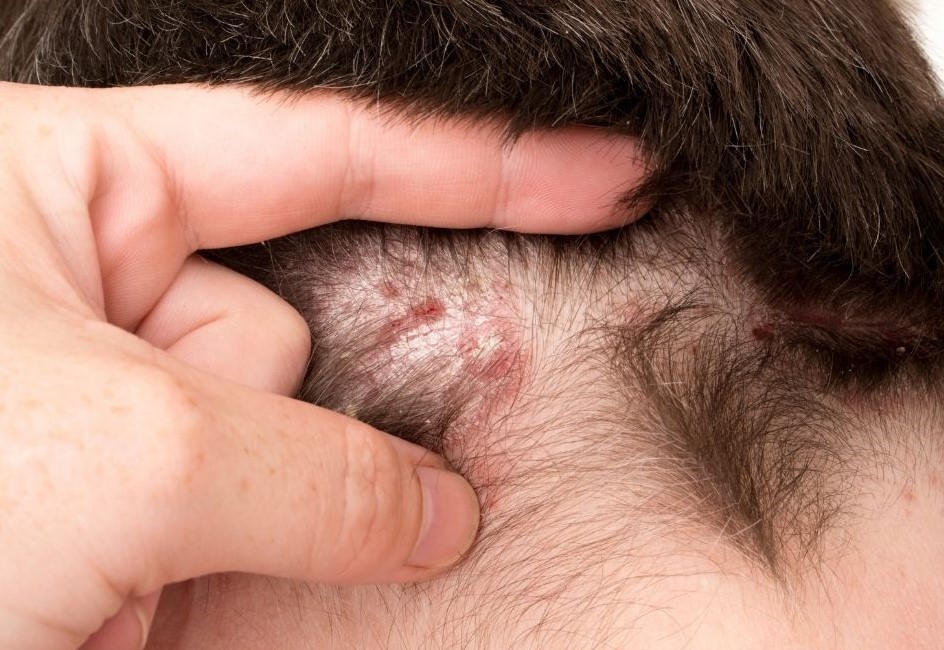
Psoriasis is a genetic autoimmune disease that causes itchy or sore patches of thick, dry, discolored skin known as plaques. The immune system, which usually attacks infectious germs, begins to attack healthy cells instead.
When psoriasis occurs on the scalp, it can lead to hair loss. While psoriasis doesn’t directly affect the hair follicles, the inflammation caused by scratching can loosen the hair follicle. There is no cure for psoriasis, but it can be treated and has been known to go into remission. Temporary hair loss is common and usually resolves when psoriasis is treated.
Psoriasis Synopsis:
- Temporary
- Usually Resolves When Psoriasis Is Treated
Ringworm
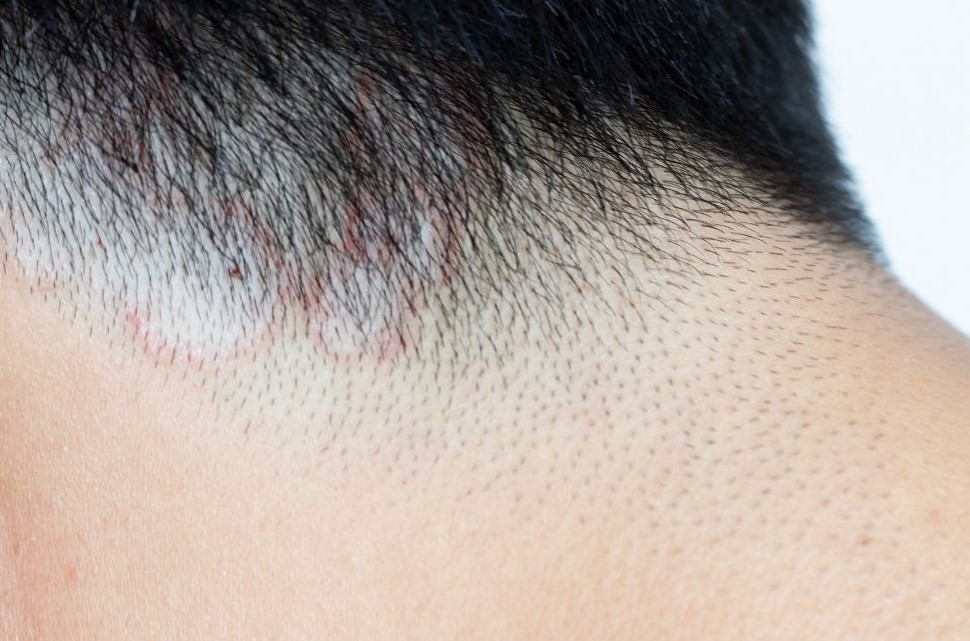
Ringworm is a contagious fungal infection that commonly affects children. When the scalp is infected, it causes itchy, dry, and flaky bald patches. The infection causes high levels of inflammation of the scalp, leading to hair loss. As the fungus progresses, it gets into the hair fibers, making them brittle and easily breakable, resulting in permanent hair loss.
Symptoms of ringworm on the scalp include itchy and scaly bald patches. It is important to get treatment as soon as possible to prevent the spread of the infection.
If left untreated, ringworm can cause permanent hair loss. Treatment usually involves antifungal medication.
Ringworm Synopsis:
- Fungal Infection
- Highly Contagious
- More Common in Children
- Bald Patches
- Itchy and Scaly
- Hair Loss May Be Permanent
- Treatment – Antifungal Medication
Syphillis

Syphilis is a highly contagious disease that’s mostly spread through sexual activity. Sexually transmitted diseases usually do not cause hair loss. However, left untreated, syphilis can cause patchy hair loss on the scalp, eyebrows, beard, and elsewhere.
Once syphilis is successfully treated, hair will usually grow back.
Syphilis Synopsis:
- If Hair Loss is Experienced It Usually Occurs in the Second Stage.
- Treatable
- Once the Immune System Recovers Hair Will Usually Grow Back
Telogen Effluvium
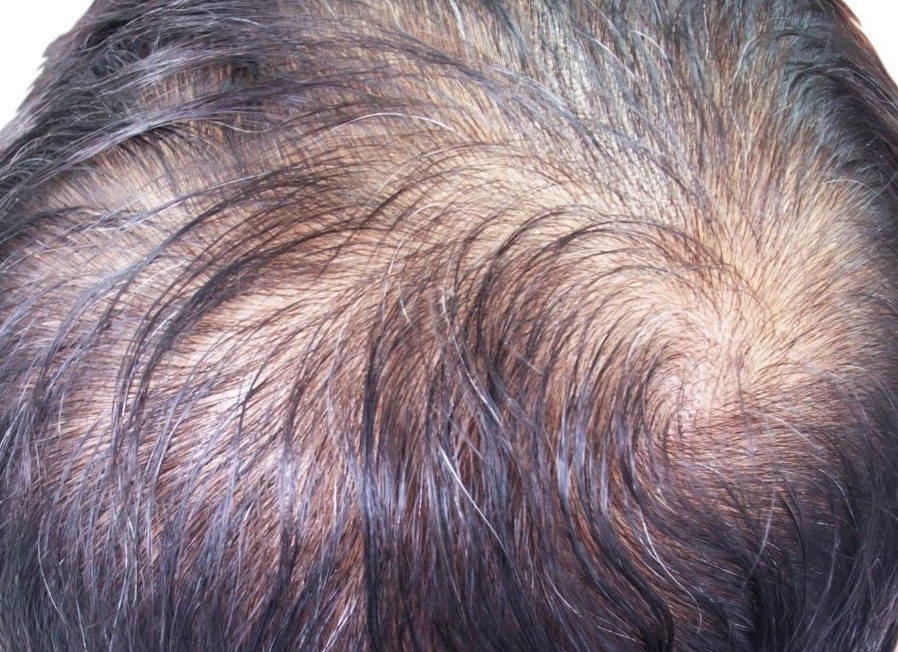
If you’ve experienced a traumatic event, shock, or stress, you may have temporary hair loss known as Telogen Effluvium. This condition causes the hair growth cycle to go into resting for a period of time. The good news is that Telogen Effluvium usually resolves itself within 3 to 6 months, and hair growth usually begins again.
Telogen Effluvium Synopsis:
- Caused by Trauma, Shock, or Stress
- Temporary Hair Loss
- Resolves in 3 to 5 Months
- Treatable
- Once the Immune System Recovers Hair Will Usually Grow Back
Thyroid

The thyroid gland is responsible for releasing hormones into the bloodstream that play a prominent role in the development, growth, and metabolism of the body. When the thyroid’s hormonal process is not balanced correctly, it can cause many health issues.
Hypothyroidism, or an underactive thyroid, occurs when the thyroid doesn’t release enough hormones. Among other things, this can cause weight gain and hair loss. On the other hand, hyperthyroidism, or an overactive thyroid, occurs when the thyroid releases too much of the hormones. With hyperthyroidism, among other symptoms, you might see unintended weight loss, irregular heartbeat, and nervousness.
Both hyperthyroidism and hypothyroidism can cause hair loss, which usually affects the entire scalp. However, with proper treatment, hair loss is temporary, and the hair will grow back once the thyroid disorder is treated.
Thyroid Synopsis:
- Hyperthyroidism – Overactive Thyroid
- Hypothyroidism – Underactive Thyroid
- Hypo and hyperthyroidism can cause hair to fall out
- Involves Entire Scalp
- In most cases, the hair will grow back once the thyroid disorder is treated
Vitamin Deficiency

If you are deficient in certain vitamins and minerals, it can lead to hair loss. Iron, Zinc, and Vitamin D are three essential nutrients that play a significant role in hair growth and maintenance.
Iron is necessary for the production of hemoglobin, a protein in red blood cells that carries oxygen and nutrients to hair follicles. Without enough iron, hair won’t grow. Incorporating iron-rich foods such as spinach, lentils, and red meat into your diet can help prevent hair loss.
Zinc is involved in hair tissue growth and repair, and it also helps keep oil glands around hair follicles healthy. A Zinc deficiency can cause hair loss and hair breakage. Adding foods such as oysters, pumpkin seeds, and cashews to your diet can help prevent hair loss due to Zinc deficiency.
Vitamin D is essential for stimulating new and old hair follicles. A deficiency in Vitamin D can lead to stunted hair growth. You can increase your Vitamin D intake by spending time in the sun, eating fatty fish such as salmon, or taking supplements.
Remember, a balanced diet rich in protein, iron, and other essential nutrients is crucial for maintaining healthy hair. If you are experiencing hair loss, it’s a good idea to consult with a healthcare professional to rule out any underlying medical conditions.
Vitamin Deficiency Synopsis:
- Iron
- Contributes to the Production of Hemoglobin
- Hemoglobin Helps Deliver Nutrients and Oxygen to Hair Follicles
- Without Enough Iron, Hair Won’t Grow
- Zinc
- Contributes to Hair Tissue Growth and Repair
- Contributes to Healthy Oil Glands Around Hair Follicles
- Hair Loss and Hair Breakage
- Vitamin D
- Stimulates New and Old Hair Follicles
- If Deficient in Vitamin D, New Hair Growth Can Be Stunted
FAQs
What are some common causes of hair loss in females?
Female pattern hair loss, which is a hereditary condition, is the most common cause of hair loss in women. Other causes include hormonal imbalances, such as those caused by pregnancy or menopause, as well as certain medical conditions such as thyroid disorders and PCOS. In addition, extreme stress or a traumatic event can also cause temporary hair loss.
How can hereditary hair loss be treated or managed?
Hereditary hair loss, also known as androgenetic alopecia, cannot be cured, but it can be managed. Medications such as minoxidil and finasteride can help to slow down or stop hair loss in some individuals. Hair transplant surgery may also be an option for those who wish to restore their hair. In addition, wearing wigs or hairpieces can help to improve the appearance of hair loss.
Can viruses cause hair loss in humans?
Yes, certain viruses can cause hair loss in humans. For example, the herpes simplex virus can cause hair loss in the area where the infection occurred. In addition, the varicella-zoster virus, which causes chickenpox and shingles, can also cause temporary hair loss.
Additional Reading
Conclusion
If you are experiencing hair loss, it’s important to consult a doctor to determine the underlying cause. As discussed in the article, there are many medical conditions that can cause hair loss in men and women. However, once the cause is identified, many times the normal hair growth cycle can be restored with proper treatment.
If you have a personal story or experience with medical-driven hair loss, we would love to hear from you in the comments below.
